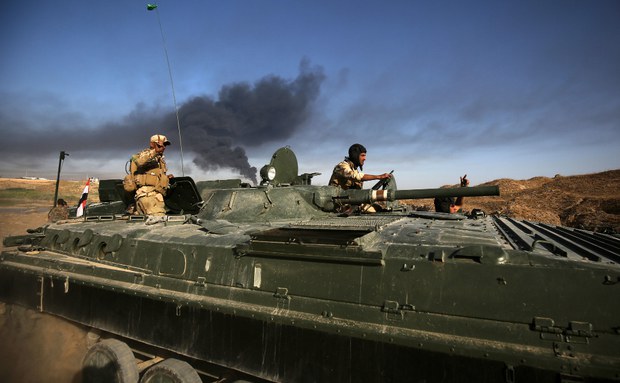Malaysia: Relative of Syria-based Fighter Among 14 IS-linked Suspects in Custody
2016.05.23
Kuala Lumpur
 Iraqi pro-government forces advance toward the city of Fallujah as part of an offensive to retake the city from the Islamic State group, May 23, 2016.
Iraqi pro-government forces advance toward the city of Fallujah as part of an offensive to retake the city from the Islamic State group, May 23, 2016.
The recent arrest of the relative of a Malaysian man allegedly fighting for Islamic State (IS) in Syria underscores how the extremist group is aggressively recruiting family members for its cause, counter-terrorism experts told BenarNews.
The man in custody, who was among 14 suspected IS supporters caught by Malaysia last week, is related to Muhammad Wanndy Mohamed Jedi, an IS fighter from the country who threatened to kill Prime Minister Najib Razak and the chief of Malaysian police, officials said Saturday when they announced the arrests.
“Authorities have to pay attention to the relatives of these IS militants, so that they do not become silent agents spreading IS ideology in this country,” P. Sundramoorthy, a professor of criminology at Universiti Sains Malaysia, told BenarNews.
According to Deputy Inspector General of Police Noor Rashid Ibrahim, the relative, whose name was not released, had wired money to IS from his bank account in Malaysia. On Sunday police confirmed they had frozen the account, but declined to give more details or say how much money had been sent to IS.
A multigenerational campaign
The 14 were arrested in police raids mounted from May 17 to 20 in six states – Johor, Selangor, Perak, Kedah, Perlis and Kuala Lumpur – bringing the number of IS suspects arrested by Malaysian police to 193 since 2013, according to statistics from Royal Malaysia Police. By the end of last year, about 1,000 Southeast Asians had joined IS in Iraq or Syria, according to the U.S. State Department.
Seven of the suspects who were picked up last week had worked at a private company. Two had their own businesses and the others included a mechanic, an aircraft technician, a former karaoke lounge hostess, a lab assistant and a laborer, Rashid said in a statement.
“Eight of the suspects were responsible for channelling funds to IS in Syria and the Abu Sayyaf Group in southern Philippines. They were detained in Kuala Lumpur, Selangor, Perak, Perlis and Johor,” he said.
The suspects range from 22 to 49 years in age, officials said.
In March, 15 suspected Malaysian supporters of IS were arrested at home and were believed to have been receiving instructions from Wanndy to raise money for the IS effort in the Middle East, police said at the time.
In February 2015, Wanndy and fellow Malaysian Mohd Faris Anuar made headlines back home when they reportedly took part in the videotaped beheading of a Syrian prisoner, which was posted online.
In November, Faris was killed while allegedly fighting alongside IS forces in Anbar province, Iraq.
The effort by IS to recruit relatives and friends of its fighters is part of a strategy by the group to entice entire families to join its cause of defending its self-proclaimed caliphate in parts of Iraq and Syria that it controls, said Rohan Gunaratna, who heads the International Center for Political Violence and Terrorism Research at the S. Rajaratnam School of International Studies in Singapore.
“IS wants males to come with their women and children into a war-zone. Single fighters coming are not sufficient to create a multigenerational campaign,” Gunaratna told BenarNews.
Last week, Zainuri Kamaruddin, a former leader of Kumpulan Mujahiddin Malaysia (KMM), appeared in a recycled video that showed Southeast Asian children being drilled on extremist ideology, trained to use weapons, and incited into burning what appeared to be Indonesian and Malaysian passports.
Through such propaganda that it disseminates online, IS tries to paint a rosy picture of life in the caliphate, where children also play and go to school, said Gunaratna, a columnist for BenarNews.
The propaganda encourages families to go and live in the Middle East together, a recruitment campaign aimed at reducing a high turnover rate among IS fighters, Gunaratna said.
“After spending a year in Syria and Iraq, nearly 50 percent of those who migrated to the so-called caliphate want to return home. It is only a small percentage of highly committed IS activists who could not make it in their own homelands who want to remain in the caliphate forever,” he said.
Fahirul N. Ramli in Kuala Lumpur contributed to this report.







